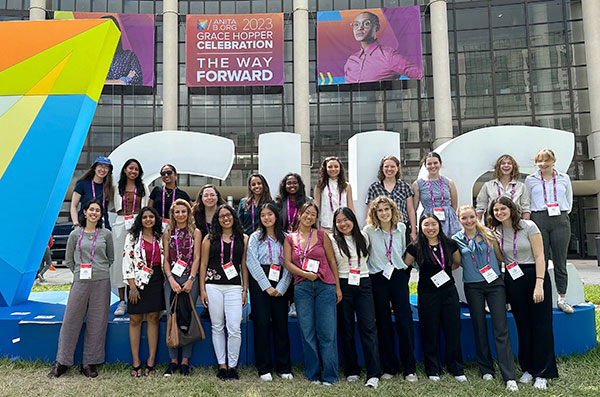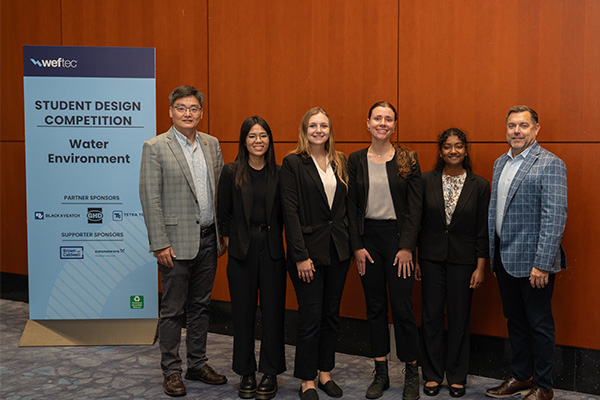McKelvey Engineers attend ‘23 Grace Hopper Celebration of Women in Computing
More than 30 students and faculty attended the annual event, which aims to empower women and nonbinary people in computing

Each year, thousands of women and nonbinary people come together for the Grace Hopper Celebration of Women in Computing to network, hear from leaders in the field and meet recruiters from the nation’s largest technology companies.
Students and faculty from the McKelvey School of Engineering at Washington University in St. Louis regularly attend the event, and this year was no different. More than 30 students and faculty attended the 2023 celebration in Orlando, thanks to funding and support from the Department of Computer Science & Engineering, the Undergraduate Student Services office and Women in Computer Science (WiCS).
Victoria Black, a senior double majoring in computer science and systems engineering, attended Grace Hopper for the first time this year after attending other women-focused conferences such as the one hosted by the Society of Women Engineers.
“I started school wanting to be an electrical engineer and ended up in computer science, so I was excited to connect with women who are doing what I plan to do after graduation,” Black said. “It's helpful to have companies prove to you that they care about diversity. They’re at Grace Hopper to hire women and to try to make the field more diverse.”
Catie Corley, a senior majoring in computer science and bioinformatics who attended the event in 2022, said she looked forward to returning to the supportive and uplifting environment the conference cultivates.
“Last year, I went for the career expo but spent more time at the panels, talking to other women and learning why they were passionate about computer science,” Corley said. “This year, I already had a job offer, so I was more motivated to go to the panels. Even though the energy was a bit different this year, I was still able to talk to people and pick their minds about the field.”
That different energy was caused by an increased number of men at this year’s event. Conference organizers reported that some of the men lied about their gender identity when registering and attended only to meet with recruiters at the career expo.
“At the opening ceremony they had a male speaker call them out and say they were taking resources and space from women,” Corley said. “He ended by saying that the men should be taking time to talk and make connections with women. I think everyone was happy they addressed it.”
Corley and Black said the influx of men didn’t take away from their enjoyment of the event.
“One talk that stuck out to me featured three women having a very technical and educated take on artificial intelligence and its applications,” Corley said. “For some reason, I had never thought of that technology as being created by women. I don't know why I had that disconnect, but learning about it from women working in the field was very impactful.”
“I met an alumna who graduated in 2017, and it was really interesting to hear how the department and WashU has changed since then,” Black said. “She told me there were only a few women majoring in computer science when she graduated. It was cool to see how the department has grown within a short span of years.”
Black spoke with the alumna during a dinner party hosted by the Women & Engineering Center for students and WashU alumni who attended the conference.
“Grace Hopper can be intimidating and confusing, so it was wonderful to see our students connect with WashU alumni at the dinner,” said Cleopatra Benos, graduate program coordinator in the Department of Computer Science & Engineering. “I look forward to seeing even more connections and friendships being fostered between current students and alumni in future years.”
Dwana Franklin-Davis, a member of McKelvey Engineering’s National Council who earned a master’s degree from WashU in 2009, also spoke at the event and met with leaders of WiCS.
“Our department sponsors students to attend the Grace Hopper celebration because we value the opportunity for them to connect with other women and nonbinary technologists in the field,” Benos said. “We are committed to creating spaces in our programs where people from all backgrounds feel welcomed and included as they pursue a career in computer science.”



